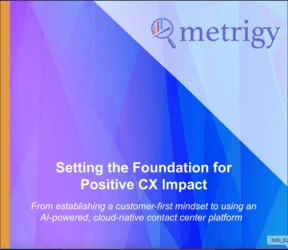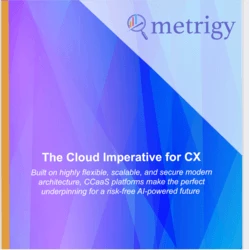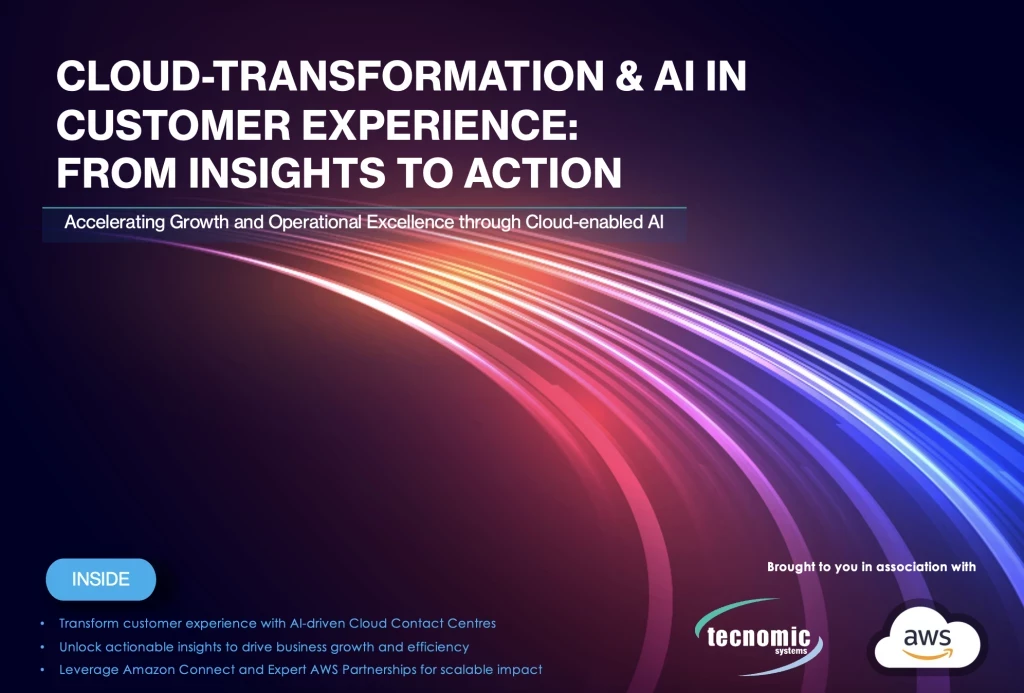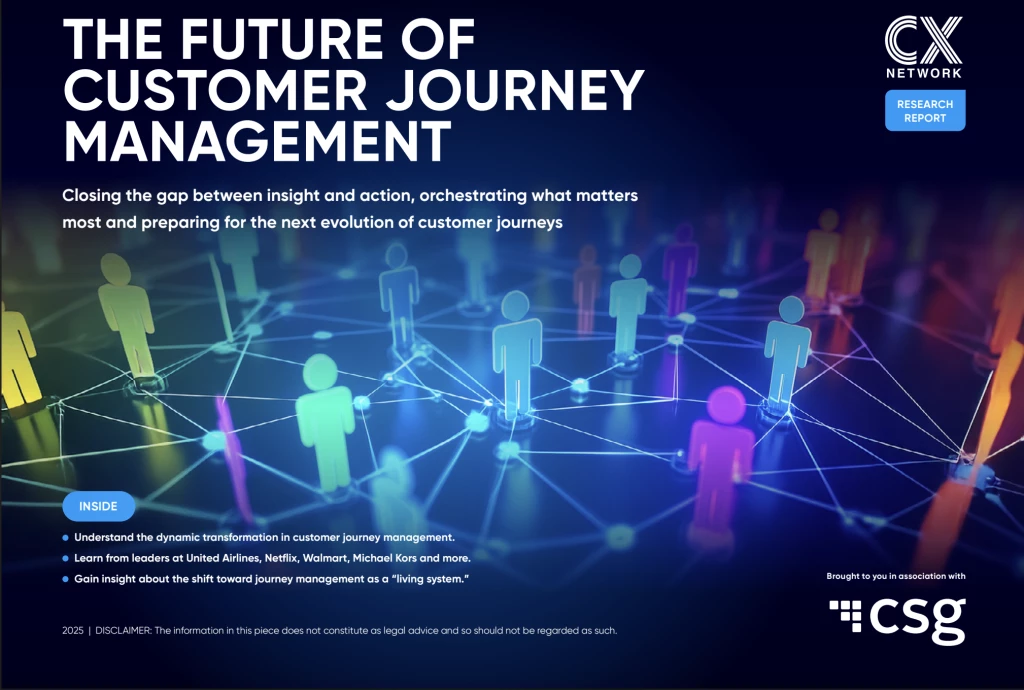Wells Fargo SVP: ‘Don't lose sight of the voice of the customer’
Add bookmarkIn this week’s podcast, the SVP National Client Service says while it’s easy to say you put customers first and listen to VOC, it’s about what’s really happening.
EPISODE OVERVIEW:
“Hope is not a strategy,†says Wells Fargo’s SVP National Client Service, Heather Magaha. She joins us in this week’s CX Network podcast interview with Seth Adler and further shares that you’ve got to have a plan but at least try something.
You can’t sit in status quo or you get nowhere, by definition, she explains. You’ve got to be brave. When she came into her role, she did hear the familiar refrain – “we’ve always done it this way†– but she was blessed with the fact that a good portion of the team didn’t like it.
Change though, as Magaha shares, is still difficult even if you actually don’t like the way things currently are. But she did have a bit of momentum on the way into the concept of change management.
“It’s easy to throw around that we put the customer first, it’s easy to throw around that we want to listen to the voice of the customer, but what is it that you’re doing to stay in touch with what’s really happening?â€
LISTEN NOW:
TRANSCRIPT:
Seth Adler: From Wells Fargo, Heather Magaha. First some supporters to thank, and thank you for listening.
This episode is supported by CX Network. CX Network provides expert commentary, tools, and resources developed by customer experience professionals, and industry insiders. With a growing membership and global portfolio of events, CX Network ensures you keep your finger on the pulse by delivering practical and strategic advice to help achieve your business goals. Wherever you are on your customer strategy journey, join the CX Networks global community today. Go to www.cxnetwork.com for more.
This episode is also supported by the Chief Customer Officer Exchange. CCOE discusses approaches on driving a profitable customer strategy at all levels of the enterprise. Join the only event focused on bringing together innovative cross-industry chief customer officers November 5th through the 7th, in Miami, Florida. Benchmark on improving customer experience, establishing customer-centric strategies, and producing more valuable customer insights, go to ccoexchange.iqpc.com for more.
Heather Magaha: Heather Magaha.
Seth Adler: That's not how you pronounce it.
Heather Magaha: It is how you pronounce it. I said "ma-ga-ha" when I married him, but it's "ma-gack-ie." Wacky Magaha.
Seth Adler: Wacky Magaha.
Heather Magaha: If you're rhyming it.
Seth Adler: Is it him or it is you, or both?
Heather Magaha: Yeah. I think he earned wacky before I did, but he's taught me a bit.
Seth Adler: Magaha.
Heather Magaha: Yeah, it's Gaelic, so it should be "ma-gah-hay."
Seth Adler: Oh, we don't do that.
Heather Magaha: No American is going to do the fur ball hacking H like that.
Seth Adler: Not happening, nope. Heather.
Heather Magaha: Magaha.
Seth Adler: I can't even because there's no-
Heather Magaha: Don't look at it. Don't look at it.
Seth Adler: I know, there's no K or anything.
Heather Magaha: I know, there's no -cky at the end.
Seth Adler: At all. That doesn't matter. What does matter is that you gave a session where you basically said, "Really all you have to do is try." Is that fair?
Heather Magaha: Yeah. I would say hope is not a strategy, so you got to have a plan, but yeah, you got to try something. You can't sit in status quo or you get nowhere. We had to get brave, and we had to try.
Seth Adler: How easy was it for you to be brave in that you came into a new position and had to change it, or did I mishear you, and you chose to change it?
Heather Magaha: I did choose to change it. I think the hurdle and the obstacle was coming into a new position having everybody around me well ingrained with what the old use to be.
Seth Adler: We do it this way.
Heather Magaha: Right.
Seth Adler: We've always done it this way.
Heather Magaha: Right. Now, what I had working in my favor is that a good portion of them didn't like it. They were used to it. By the way, that doesn't mean though that change is necessarily easy because change is still hard even if you don't like how it's been done. I did have that momentum heading into the idea to make the change.
Seth Adler: Let's just give the overview. It was a 40-minute session. We don't have that kind of time together.
Heather Magaha: Right, right.
Seth Adler: Essentially, from day one, what did you do and how long did it take?
Heather Magaha: It was about a year journey, year-and-a-half if you include the pilot. We had what we called service reviews in the beginning. We were asking our customer-facing folks to look at a six-month snapshot of data and make recommendations to customers only based on the data. That's really where we were going wrong. Not only were we having a very narrow view of how to add value, but we were asking them to deliver that information in a really old fashion that didn't feel comfortable. It wasn't resonating with people.
Seth Adler: Well, wait a second. I'm supposed to be data driven, and I'm supposed to do everything on what the data says. I thought that's the new way to look at it.
Heather Magaha: We are never going to be able to remove the value that humans bring to the conversation. What was really rich in the transformation that we made to service consultations is that they still start with the data, but then we asked them to use all of the other information that they have coming into them at their disposal, whether that's internal partners or just the little, valuable nuggets that the customer was dropping.
Seth Adler: Such as?
Heather Magaha: You're never going to capture it in data. The example that I used that I think resonates is we could have a customer-facing agent that hears from their customers, "Oh, you know, the treasurer, we got a new boss today, and he doesn't know how to send out wires," or whatever the banking function is of the day. That may not be the expressed need of why they called. You may end up answering the expressed question they've asked. That nugget of, oh, there's somebody at the company, who I could add value to.
Seth Adler: Right.
Heather Magaha: Let me call them. Let me walk them through how to X, Y, Z on the system because it's going to make them more successful and the person that I'm talking to.
Seth Adler: The results were kind of astonishing, right?
Heather Magaha: Yeah, absolutely.
Seth Adler: 18% to whatever. What was it?
Heather Magaha: It was we went from 15% tangible results to 85%, just a massive change in the value that we were adding to the interaction. It's funny, before when we were hovering around that 15%, that's not a great ROI. Oftentimes, we were seeing the sales force uninvite us to the customer conversations.
Seth Adler: Sure. Thanks but no thanks.
Heather Magaha: Yeah, they couldn't be sure that we were going to deliver something that deserved the shelf space with the client.
Seth Adler: Right.
Heather Magaha: Then as we saw that needle move to the 85% all of a sudden, they're blowing up my T&E budget now. They're wanting our customer service folks at the table for lots of those conversations.
Seth Adler: Some of this is that we added the human element, if you will, to the data. That can't be it. You can't go from 15 to 85 or whatever you just said, or is that just it?
Heather Magaha: No, it's not just it. What was baked into that year, year-and-a-half journey was developing the tools and the methodology, and then ultimately the training for the folks. They had the intel. They have the smarts, but they hadn't previously been empowered. You've got to find a way to open up their mind and then give them the resources so they have a starting point and then just watch it take off.
Seth Adler: Data, process, human element, bingo.
Heather Magaha: You got it.
Seth Adler: All right. How are you so smart? Why did they say, "Heather, go" ... They didn't even say, "Heather, go do this." They said, "Heather, congratulations. You have a new job."
Heather Magaha: That's right.
Seth Adler: You're like, "Oh God, I'm going to have to change everything."
Heather Magaha: That's right. It's funny, you're right because there wasn't a mandate to change. I think what really started bringing it to light was just having frank conversations with my partners. They knew that I was new to the role. They knew that they could give me the feedback. I didn't have the baggage, and so those frank conversations led to what was not great about it and how it could potentially be great.
Seth Adler: With the planes flying over above and I think also geese, we have to mention that we're outside here.
Heather Magaha: We are. It's a lovely, lovely setting.
Seth Adler: As those things happen, let's dive in, right. Because you get into the role, and you just start talking to people, right. We need to figure out where this personality was developed, if that makes sense. You and I, I guess based on your O's and other things and your y'alls, that you have some Maryland roots, you have some Virginia roots, you have some North Caroline roots. Most of all, it's Southern Florida.
Heather Magaha: That's right. That's right. If we want to be best friends after this, let's make sure that we not disparage my Florida Gators.
Seth Adler: Why would I do that?
Heather Magaha: Well, I hope not. You seem to be a man of character.
Seth Adler: Yeah, sure. It's also I want to a Division III school, so it's very easy ...
Heather Magaha: All right, good.
Seth Adler: ... for me not to offend anybody.
Heather Magaha: Then we can be friends.
Seth Adler: Because I essentially have no idea what's going on, as far as that's concerned. Go Gators, sure.
Heather Magaha: Go Gators.
Seth Adler: All right. When you were growing up, you told me Fort Myers.
Heather Magaha: Fort Myers.
Seth Adler: You're running around. How many siblings did you have?
Heather Magaha: None, just me.
Seth Adler: This is an answer. Okay. Because my girlfriend who is aforementioned now also an only child. That comes with its own stuff.
Heather Magaha: It does.
Seth Adler: You're a very important person.
Heather Magaha: Well thank you. I'm glad you think so.
Seth Adler: I'm say that that's what your parents think.
Heather Magaha: Oh absolutely. It taught me that concept very early.
Seth Adler: Sure. Very important.
Heather Magaha: And a bit of a daddy's girl.
Seth Adler: Sure. When did other people start coming into this? You know what I mean? When you start to get around friends, when did your personality come out? What did they start sharing, "Oh, Heather's this way"? When did you start realizing what other people thought? Is that a fair question?
Heather Magaha: Yeah. Who knows how they would answer? I can see the early beginnings of my career, probably from late middle school through high school into college, I didn't know how to join something without leading it. It was probably a bit much at times, but yeah, some of that natural leadership.
Seth Adler: I have the Groucho Marx theory of I would never be part of a group that would have me as a member. Your point is I don't know how to be part of a group without leading it.
Heather Magaha: Yeah, I struggle with that a little bit.
Seth Adler: Is that from your parents, do you think?
Heather Magaha: No.
Seth Adler: Because being important is one thing, leading is a different. That's a different tool.
Heather Magaha: It is a different thing. I would say my parents gave me some really unique qualities. Number one, they were both bankers. I was hearing the talk, watching the walk from a very young age. My father has tremendous business acumen mixed with unparalleled political savvy inside of an organization.
Seth Adler: I see.
Heather Magaha: I've been able to model some of what I saw there. Then my mother is the most resourceful person you will ever meet. She was raised on a farm. I've seen her teach herself how to do hardwood floors, re-wallpaper, re-plumb a toilet.
Seth Adler: Really?
Heather Magaha: Cook crazy- yeah. That's a really unique combination to have grown up with.
Seth Adler: If you need it done, she can do it.
Heather Magaha: Call her. Call Carol.
Seth Adler: I was going to say, Mrs. Magaha, but she's not, right?
Heather Magaha: No, no, no. We call her CC, Crazy Carol.
Seth Adler: Crazy Carol.
Heather Magaha: Call Carol because she is going to get it done.
Seth Adler: I gotcha.
Heather Magaha: I guarantee she has a roll of duct tape in her car right now.
Seth Adler: Really?
Heather Magaha: It solves most of the problems.
Seth Adler: It really does solve a lot of stuff. If you don't know about duct tape, look into it.
Heather Magaha: Amen.
Seth Adler: All right. When did you decide to go to Florida and did you go with a major or not?
Heather Magaha: Seth, here's where our story comes to a divide.
Seth Adler: Oh boy.
Heather Magaha: I did not go to Florida.
Seth Adler: Wait, I don't understand. We just talked about the Florida-
Heather Magaha: Well, I bleed orange and blue. I was raised going to all the season games for Florida.
Seth Adler: Sure, fine.
Heather Magaha: The North Carolina mountains were calling me.
Seth Adler: I see.
Heather Magaha: I decided to go off on a wild hair and because the school paid every dime of my education.
Seth Adler: Sure, that'll help.
Heather Magaha: I went to High Point University, a small, private liberal arts college in High Point, North Carolina, and then did my master's work at Wake Forest.
Seth Adler: Wake Forest, okay we'll get to that in a second, Tim Duncan, who you remember, I'm sure, right. He was good. Let's be honest.
Heather Magaha: A little bit good.
Seth Adler: Yeah, very good. Not even a little bit. Undergrad, I understand you went, but what were you studying undergrad? Did we figure it out yet?
Heather Magaha: Undergrad, I was studying business with a double concentration in finance and management of information systems.
Seth Adler: We were going where we were going. We knew this.
Heather Magaha: Yeah, we were on the path.
Seth Adler: Dad and mom, good coaching, right. Let's get in. Let's do this. Small liberal arts college, they're paying for everything. I feel like it's probably not too hard for you.
Heather Magaha: Right.
Seth Adler: Right?
Heather Magaha: It was working out pretty well.
Seth Adler: There we go. Then the Wake Forest thing happens. Was that more difficult? Was that like all of a sudden we're being tested a little bit?
Heather Magaha: Yeah, that was a different rigor. I remember coming home after my first econ class, which I had sailed through in undergrad. I remember coming home crying to my now husband and saying, "I just don't belong there." Sitting in that group of 69 other really talented people, and it was the first time that I was around a group that, yeah, they pushed me.
Seth Adler: There you go.
Heather Magaha: It was a great experience.
Seth Adler: You're used to being the leader. You're used to being important. You have these new feelings, which the rest of us, by the way, have had the whole way through. You got to wait until graduate school to get into this. Maybe what did he say? How did he help? What did you think to get back on the horse?
Heather Magaha: Well, it's not a statement that has a lot of finesse to it, but I think his words were something to the effect of, "Heather, people dumber than you have figured this out."
Seth Adler: He's not wrong.
Heather Magaha: He's not wrong, and I sat back. I just doubled down and studied harder. It was also a really good lesson in learning and using and leveraging the resources around me because then I figured out who was really, really smart in the class and then picked them to be on my team.
Seth Adler: Right. Then you figured out the political stuff that your dad had.
Heather Magaha: You got it.
Seth Adler: You're like, "Oh, I can use that in graduate school. Hey Dave."
Heather Magaha: Yeah, that's right.
Seth Adler: "Let me buy you a beer, Dave."
Heather Magaha: That's right. I bought the accountant on our team a lot of beer.
Seth Adler: There you go. This is what it was. What were we drinking at Wake Forest, I wonder?
Heather Magaha: Oh gosh. Probably back then, it probably was just Coors Light.
Seth Adler: Coors Light. Rolling Rock, was that in there at all?
Heather Magaha: Nah, I can't do, no.
Seth Adler: Because that's Pennsylvania. Wake Forest, where is Wake Forest?
Heather Magaha: Winston-Salem, North Carolina.
Seth Adler: Oh it is North Carolina.
Heather Magaha: Now, we'd be drinking Foothills or one of the other local brews.
Seth Adler: A nice microbrew because you're classy.
Heather Magaha: That's right.
Seth Adler: There we go. You get through now. Now you figure it out.
Heather Magaha: I got it.
Seth Adler: Then the first organization that says, "Heather, we want you. Come on. Come on over." Who was that?
Heather Magaha: I've technically been with the same company for my 20-plus year career, and it was the original, original, what we call the blue Wachovia. It was the original Wachovia bank prior to their merger with First Union.
Seth Adler: Which was then when they became the green Wachovia, right?
Heather Magaha: Yeah, well, we called them the teal or the plaid.
Seth Adler: I see.
Heather Magaha: We did the blue-green thing ...
Seth Adler: Right.
Heather Magaha: ... when Wachovia and First Union came together but kept the Wachovia name. Then since 2009, Wells Fargo.
Seth Adler: Blue Wachovia, what was your remit, your job?
Heather Magaha: This is also a funny story. I failed at getting hired at Wachovia the first time or two. Just conveniently didn't get a callback, and I had a lovely professor who made a very important phone call that ...
Seth Adler: Interesting.
Heather Magaha: ... opened the door.
Seth Adler: Interesting.
Heather Magaha: I joined their investment operations management training program. It was back in the day when many of the banks had many, many management training programs.
Seth Adler: Sure.
Heather Magaha: Sadly, I did not understand what the word operations meant. Truly, I did not understand. I heard the word investment, and I thought, "Outstanding. They are going to teach me how to trade on Wall Street."
Seth Adler: I can't wait for this. This is going to be great.
Heather Magaha: I got in the program, but I'm so glad that it worked out the way that it did.
Seth Adler: When did you figure out what operations meant?
Heather Magaha: As soon as I walking in day one and saw rows and rows and rows of cubes. I was like, "Ding, ding, ding."
Seth Adler: I see.
Heather Magaha: I'm starting to get this now. It was a fabulous learning experience. What I realized is the back office, front office that wasn't so important to me, but I'm a learner. I loved the processing and the engineering side of being in operations. Yes, I had a great couple-year run in the group. I priced illiquid securities. I managed our trust vault so all of the assets, furs and diamonds and all of that that get held in trust.
Seth Adler: Look at that.
Heather Magaha: That was all very interesting.
Seth Adler: What, Heather, was it that they did not see those first couple times when you didn't get the job? In other words, we had the professor call, thanks so much. We can see now why, of course, this all makes sense. What was still missing, I guess?
Heather Magaha: Right.
Seth Adler: Because you got hit in the face, if you will...
Heather Magaha: Right.
Seth Adler: ... at Wake Forest. It sounds like we still weren't fully developed yet.
Heather Magaha: In actuality, that happened at High Point. I was already working at the bank when I went to Wake. I don't know if it was the smaller school and the lack of name recognition. Now they have fabulous name recognition, but back then, not so much.
Seth Adler: Got it.
Heather Magaha: I don't know, if you were to ask them, which I did, they all claim it was just an administrative error. That I was on the list.
Seth Adler: Sure, right.
Heather Magaha: That's what I said too, "Sure."
Seth Adler: Well, I mean that's what they're going to tell you now. Of course, it was an error. Everybody could see that it was an error. All right. Blue Wachovia and then what, plaid happens?
Heather Magaha: Plaid happens.
Seth Adler: How did plaid happen for you?
Heather Magaha: For me, I was called in the room at 9:00 in the morning. This was after we knew that we merging with First Union. I was told, "Thank you, but no thank you," and "You won't have a job ...
Seth Adler: Look at you.
Heather Magaha: ... in the future."
Seth Adler: I was not expecting that to be what happened in the meeting.
Heather Magaha: Yeah, it did. An hour later, we got to tell 653 of our closest friends. Our entire operation already existed in the First Union world and markets that were going to survive. I was a free agent at that point and leveraged my network in the MBA program at the time at Wake. I had a colleague that said, "Hey, you should try the sales thing, Heather. I think you'd be really good at it." I said, "Well, I've never sold anything a day in my life." She was like, "Yeah, yeah, it's all right." She made a call, and the next thing I know, I'm sitting down in an interview. The lead banker says, "You know, you're like a lottery pick at this point." I said, "I know, so let's try to win a million bucks." I convinced him to hire me.
Seth Adler: Wait a second, lottery pick like lottery like we all play it or lottery pick like Tim Duncan lottery pick?
Heather Magaha: No, lottery pick in as you could be worth a fortune or you could turn out to be a total dud.
Seth Adler: Nothing, right.
Heather Magaha: It's like a scratch ticket. It could go a multitude of ways.
Seth Adler: What I love about this is you're like, "Yeah, okay. Fine."
Heather Magaha: Well I was. There was no arguing that I didn't have sales experience.
Seth Adler: Got it, right.
Heather Magaha: It worked out really well, and I did that for a couple of years. Now, being in customer service, I so much better appreciate what our relationship managers and our sales people go through. It makes me much more empathetic, and it buys me credibility.
Seth Adler: Well that's definite, right, because you were on the sales side. They say, "Oh no, you did this. Okay fine, you get it." The other part of you knowing, you actually knowing how hard that is, you have to do it to know how hard it is, right?
Heather Magaha: Yes, yes.
Seth Adler: You cannot fake that.
Heather Magaha: No, there is no way to replicate the feeling of hero to zero when you've make your sales goal and now it's time to start over. There's just no way to replicate that feeling.
Seth Adler: That's the Janet Jackson, "What have you done for me lately?"
Heather Magaha: That's exactly it.
Seth Adler: Okay great, we got into sales. Everything is doing just fine. Then, where in this whole conversation is the economic apocalypse? Because it's coming up here, I would imagine, right?
Heather Magaha: It is. It is. Before the apocalypse happened, I found myself un-enamored with sales, and I had done my tour of duty. The call back to operations or to serve was pulling me in. I made my transition to customer service at that point.
Seth Adler: Before.
Heather Magaha: Before. It was funny. I had the best of both worlds. I was in a service group that rolled up within operations within our company, so I had both flavors.
Seth Adler: Totally.
Heather Magaha: Then the financial crisis hit.
Seth Adler: You're sitting there at Wachovia, which is not a brand name anymore.
Heather Magaha: Correct.
Seth Adler: Just give us a sense, you're in customer service, okay fine. I would imagine director-ish level at least, right? Not even.
Heather Magaha: No, no.
Seth Adler: Lower level than that?
Heather Magaha: Yeah, yeah.
Seth Adler: Really?
Heather Magaha: I was managing managers. At the company then, I was barely mid-level management.
Seth Adler: Not high level.
Heather Magaha: Correct.
Seth Adler: How did you find out about this? Because I found out about it by everybody going crazy, right, like in the news.
Heather Magaha: That's how we found out about it too.
Seth Adler: That's how you found out about it too.
Heather Magaha: I was sitting on the beach on vacation, and my phone started blowing up. They said, "You've just been bought by Citi." Then it was, what, 24, 48 hours, "No, just kidding. You've been bought by Wells Fargo."
Seth Adler: Right.
Heather Magaha: Then there was all the rumors about the doors closing. Yeah, it was a scary time.
Seth Adler: I remember before that moment of Citi, no, Wells Fargo, I remember Wachovia was one of the institutions that had to get bought.
Heather Magaha: Yes.
Seth Adler: You know what I mean? It was like Merrill Lynch had to get bought.
Heather Magaha: Yes.
Seth Adler: Wachovia had to get bought.
Heather Magaha: Yes.
Seth Adler: You went on vacation it sounds like.
Heather Magaha: At that point though, at our levels, there was no understanding. We knew we were in trouble.
Seth Adler: Got it.
Heather Magaha: The average Joe in the company did not have a good concept that we were like the other ones that were falling in the days before us.
Seth Adler: Huh, interesting. I was watching the appropriate amount of CNBC to know essentially.
Heather Magaha: Yes.
Seth Adler: I've switched to Bloomberg, and the CNBC people can call me and try to get me back, but whatever. All right. That happens, and you get back from vacation. What kind of transition was it for you?
Heather Magaha: Everybody was definitely in a state of panic. I think people were cautiously optimistic about merging with Wells Fargo ...
Seth Adler: Right.
Heather Magaha: ... especially when you looked at who was left in the field ...
Seth Adler: Sure.
Heather Magaha: ... from a culture perspective. Wachovia always had a stellar reputation for putting the customer first. That bank was built on that concept. That's what everybody was so intent on protecting as we look towards what's next in the future.
Seth Adler: Because at that time, it was Chase, Well Fargo, Bank of America, Citi. Out of those four, Wells Fargo was a good pick.
Heather Magaha: That's right.
Seth Adler: Is that a fair way to say it from a layperson's point of view?
Heather Magaha: I would agree.
Seth Adler: When did the Wells Fargo people realize who you were?
Heather Magaha: It's funny, people talk about you make your own opportunities. At the time, I didn't know that I was making my opportunity, but I can see it in hindsight. I called my boss a couple of days after returning. I said, "Hey, I don't know what's going to happen with this whole Wells Fargo thing, but if you need anybody to go to San Francisco to talk about what we do or help with merger activities, I would love to be a part of that work."
Seth Adler: Put me in, coach.
Heather Magaha: Put me in, coach. It made it really easy for him because then when the first call came to say, "We're going to get that first combined group of people together," he didn't have to decide who to pick. It was an easy way out for him to tell the rest of the team that didn't get picked, "Heather offered first, so she's going."
Seth Adler: She called me.
Heather Magaha: That's it. That's it. That meeting really was pivotal. We had a mixed audience of Wells Fargo and Wachovia people, and who became my boss said it was just really clear that I knew my business and could speak to what was going on. Then I became a valuable resource to know the land we were coming from to mount the land we were going to.
Seth Adler: Great. You go ahead and make that transition.
Heather Magaha: I do.
Seth Adler: Then, when did we get to the point where they picked you out for this new place, which we already discussed?
Heather Magaha: I think I was able to quickly gain credibility with the legacy Wells Fargo team. They understood that I had a shared vision even if I had come from a different company. That was really when my scope of responsibility started really taking off. It's funny, people always talk about M&A activity as being painful, and I'm like, "Well, no, actually it gave me some of the best opportunities of my career." Then I got to start growing the number of sites and the number of people and setting more and more strategy.
Seth Adler: As far as heading a contact center, what advice would you give your colleagues?
Heather Magaha: Gosh, I would say, "Don't lose sight of the voice of the customer." I know that sounds a little cliché, but here's what I really mean by that. If you really get into the nuggets of that, it's easy to throw around that we put the customer first. It's easy to throw around that we want to listen to the voice of the customer. Really put the pen to paper and what is it that you're doing to make sure that you're staying in touch with what's really happening? I find a tremendous amount of value still every time I make a site visit to any of my locations. I still sit and shadow my CSO for at least two hours...
Seth Adler: I love it.
Heather Magaha: ... a day.
Seth Adler: That's great.
Heather Magaha: Because I have to know what their pain points are, I have to see the tools and the infrastructure I have provided them to serve, and I also want to hear what the customer is saying directly.
Seth Adler: Aside from sitting right next to them, what's a secret of managing people?
Heather Magaha: Oh gosh. Being an excellent communicator. I think there are so many really, really bright people out there that can't get out of their mouth what's in their head. It's unfortunate, and it's sad because they have brilliant things going on. If you can't communicate in a way that really resonates with people helps them understand the vision, the only person benefiting from that brilliant idea is you.
Seth Adler: Huh. Which is not enough people.
Heather Magaha: That's not enough people.
Seth Adler: You're going to need more people on the team.
Heather Magaha: You need a few more people getting some things done, absolutely.
Seth Adler: I could talk to you all day, and I really would love to do that, but I feel like we've got other things to do. I'll tell you what the three final questions are, and then I'll ask you them. What has most surprised you at work? What has most surprised you in life? On the soundtrack of your life, one track, one song that's got to be on there. First things first ...
Heather Magaha: Wow.
Seth Adler: ... we just went through your career quickly, let's be honest. What's most surprised you at work?
Heather Magaha: The level of impact that sponsors and advocates have played in my journey.
Seth Adler: Unpack that. What do you mean?
Heather Magaha: There is a vast difference between mentorship and sponsorships. A mentor is somebody who you're going to tell the good, the bad, the ugly. They're going to guide you. They're going give you the really direct feedback. The sponsors are the people that you hope they know the good, the good, and the good about you, and that's what you're going to tell them. Those are the people willing to stake their reputation to speak on your behalf when you're not in the room. I can look back at my career, again, in hindsight. I didn't know it was happening when it was happening.
Seth Adler: Sure.
Heather Magaha: There are very key people and pivotal moments where people were advocating for me that opened doors that led to the next best thing.
Seth Adler: For the folks that are younger that are listening to this, how can they attract a sponsor?
Heather Magaha: You have to be visible. It's not like getting a mentor. You can't go to somebody and say, "Will you be my sponsor?" It doesn't work like that like it does with mentorship. First of all, there is no substitute for doing good work and working hard, but the key is then you have to get it in front of the right people. Once you notice that someone is starting to talk well about you, feed them more. Keep putting the really good stuff in front of them because you've got the momentum. They've noticed you. Now give them more to talk about when you're not in the room.
Seth Adler: Interesting. That's tough to do for somebody that doesn't have a big ego, I guess. Does that make sense? In other words, and let me clarity what I mean. You did this unknowingly, and you just said, "Unwittingly, I can't believe the import that had in my career."
Heather Magaha: Right, right.
Seth Adler: If you're telling somebody to knowingly do this, if I don't have a big ego, that sounds uncomfortable.
Heather Magaha: Oh, it's hugely uncomfortable. When I talk to younger folks about that, that's absolutely what I get. It's almost like I have to convince them that it's not wrong. You need to be doing this. The old adage of I'm going to keep my head down, do really good work, and somebody's going to notice, you're shortchanging yourself. It's not about being manipulative. It's not about office politics. It's about being observant. It's about observing what your brand is, how people are talking about your brand, who's talking about you, and then just being thoughtful about what you put in front of that person.
Seth Adler: You're so smart. It's a little bit unsettling.
Heather Magaha: Well, thanks. I think.
Seth Adler: Of course. No, like unsettling it's like too smart, like one extra. What's most surprised you in life?
Heather Magaha: Gosh. I would say the unadulterated joy that my children have brought me. I would never have understood how high that high can be. Likewise, I would also not necessarily have understood then you can be equally at a low point. The level of emotions that my children bring out in me has been extremely surprising.
Seth Adler: How many of these people are there?
Heather Magaha: I have two little people, two fabulous boys, four and 11, otherwise known as "sweet and mild" and "sweet and wild."
Seth Adler: Interesting. "Sweet and mild" is older.
Heather Magaha: Of course, yes. He is the carbon copy of me.
Seth Adler: That's how that goes. Then "sweet and wild" is?
Heather Magaha: "Sweet and wild" is my husband. He is a carbon copy of my husband, and he will cause me to be gray at an early age.
Seth Adler: Do you know what must be amazing to watch?
Heather Magaha: What's that?
Seth Adler: The four of you, anywhere.
Heather Magaha: It is a bit of a sideshow.
Seth Adler: Right.
Heather Magaha: I have to admit.
Seth Adler: Exactly. Soundtrack time. On the soundtrack of your life, one track, one song that's got to be on there.
Heather Magaha: That's easy, "I Have Found Me a Home" by Jimmy Buffett.
Seth Adler: Oh my goodness. You did Jimmy Buffett, and you didn't do Margaritaville.
Heather Magaha: Yeah, that's fun, and we're going to sing it, but that's not the soundtrack of my life.
Seth Adler: Are you a self-proclaimed Parrothead?
Heather Magaha: I am a die-hard Gator fan and a very loyal Parrothead.
Seth Adler: Which brings us back to Florida.
Heather Magaha: That's it.
Seth Adler: And scene. It's easy to throw around that we put the customer first. It's easy to throw around that we want to listen to the voice of the customer, but what is it that you're doing to stay in touch with what's really happening? Very much appreciate Heather and her time. Very much appreciate you and yours. Stay tuned.





















